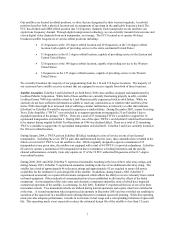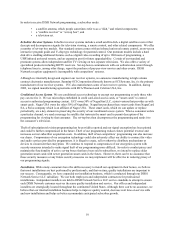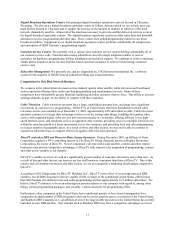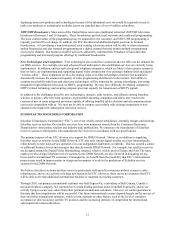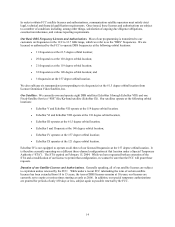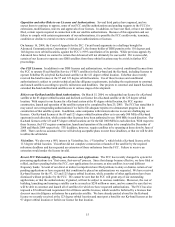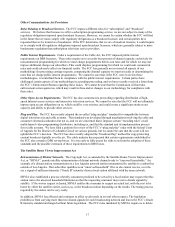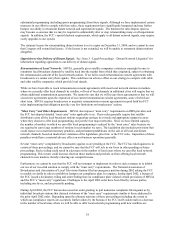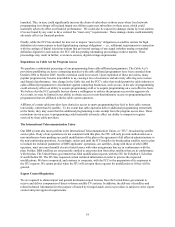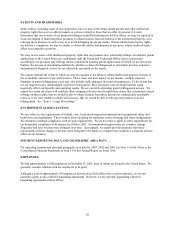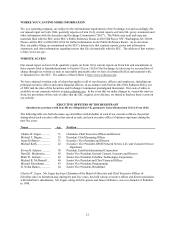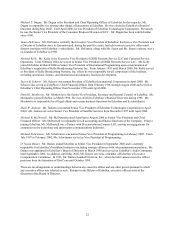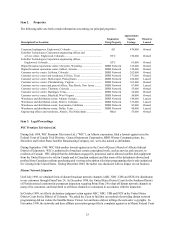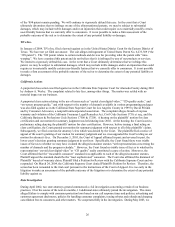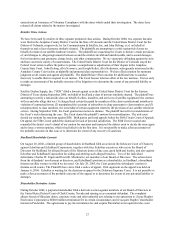Dish Network 2003 Annual Report Download - page 22
Download and view the complete annual report
Please find page 22 of the 2003 Dish Network annual report below. You can navigate through the pages in the report by either clicking on the pages listed below, or by using the keyword search tool below to find specific information within the annual report.17
Other Communications Act Provisions
Rules Relating to Broadcast Services. The FCC imposes different rules for “subscription” and “broadcast”
services. We believe that because we offer a subscription programming service, we are not subject to many of the
regulatory obligations imposed upon broadcast licensees. However, we cannot be certain whether the FCC will find
in the future that we must comply with regulatory obligations as a broadcast licensee, and certain parties have
requested that we be treated as a broadcaster. If the FCC determines that we are a broadcast licensee, it could require
us to comply with all regulatory obligations imposed upon broadcast licensees, which are generally subject to more
burdensome regulation than subscription television service providers.
Public Interest Requirements. Under a requirement of the Cable Act, the FCC imposed public interest
requirements on DBS licensees. These rules require us to set aside four percent of channel capacity exclusively for
noncommercial programming for which we must charge programmers below-cost rates and for which we may not
impose additional charges on subscribers. This could displace programming for which we could earn commercial
rates and could adversely affect our financial results. The FCC has generally not reviewed all aspects of our
methodology for processing carriage requests, computing the channel capacity we must set aside or determining the
rates that we charge public interest programmers. We cannot be sure that, if the FCC were to review these
methodologies, it would find them in compliance with the public interest requirements. Certain parties have
challenged certain aspects of our methodology in a pending proceeding, and we have recently received a letter from
the FCC’s Enforcement Bureau regarding these issues. We cannot be sure that the Commission will not take
enforcement action against us, which may result in fines and/or changes to our methodology for compliance with
these rules.
Other Open Access Requirements. The FCC has also commenced a proceeding regarding distribution of high-
speed Internet access services and interactive television services. We cannot be sure that the FCC will not ultimately
impose open access obligations on us, which could be very onerous, and could create a significant strain on our
capacity and ability to provide other services.
Plug and Play. The FCC has recently adopted the so-called “plug and play” standard for compatibility between
digital television sets and cable systems. That standard was developed through negotiations involving the cable and
consumer electronics industries but not us, and we are concerned that it imposes certain “encoding rules” on all
multichannel video programming distributors, including us, and that the standard and its implementation process
favor cable systems. We have filed a petition for review of the FCC’s “plug and play” order with the federal Court
of Appeals for the District of Columbia Circuit on various grounds, but we cannot be sure that the court will not
uphold the FCC’s decision. The FCC has also recently adopted the “broadcast flag” method for copy-protecting
content broadcast digitally over the air. The cable industry has requested that certain requirements established by
the FCC also extend to DBS set-top boxes. It is too early to fully assess the risks to us from the adoption of these
standards and the possible extension of these requirements to DBS boxes.
The Satellite Home Viewer Improvement Act
Retransmission of Distant Networks. The Copyright Act, as amended by the Satellite Home Viewer Improvement
Act, or “SHVIA”, permits satellite retransmission of distant network channels only to “unserved households.” An
example of a distant station retransmission is a Los Angeles network station retransmitted by satellite to a subscriber
outside of Los Angeles. That subscriber qualifies as an “unserved household” if he or she cannot receive, over the
air, a signal of sufficient intensity (“Grade B” intensity) from a local station affiliated with the same network.
SHVIA also established a process whereby consumers predicted to be served by a local station may request that this
station waive the unserved household limitation so that the requesting consumer may receive distant signals by
satellite. If the waiver request is denied, SHVIA entitles the consumer to request an actual test, with the cost to be
borne by either the satellite carrier, such as us, or the broadcast station depending on the results. The testing process
required by the statute can be very costly.
In addition, SHVIA has affected and continues to affect us adversely in several other respects. The legislation
prohibits us from carrying more than two distant signals for each broadcasting network and leaves the FCC’s Grade
B intensity standard unchanged without future legislation. The FCC rules mandated by SHVIA require us to delete


